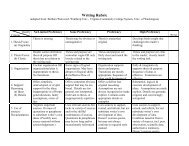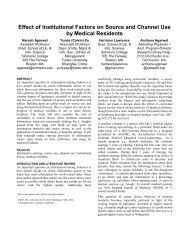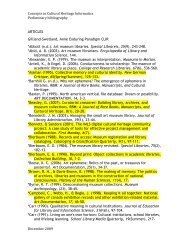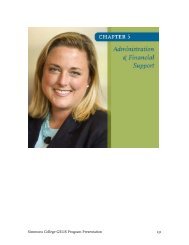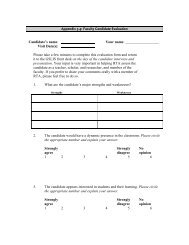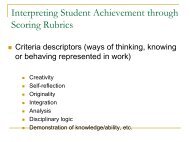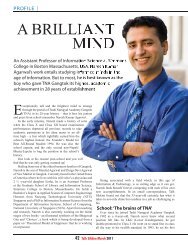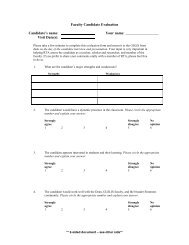SIGCHI Conference Paper Format - Graduate School of Library and ...
SIGCHI Conference Paper Format - Graduate School of Library and ...
SIGCHI Conference Paper Format - Graduate School of Library and ...
You also want an ePaper? Increase the reach of your titles
YUMPU automatically turns print PDFs into web optimized ePapers that Google loves.
the state <strong>of</strong> Massachusetts, the collection is quite extensive.<br />
It includes all research core journals, pr<strong>of</strong>essional <strong>and</strong> trade<br />
periodicals, popular magazines, <strong>and</strong> newsletters. This<br />
provides the opportunity to develop a complete picture <strong>of</strong><br />
all the literature that is produced in the field.<br />
At the same time, this will prove to be a challenge. A<br />
content analysis <strong>of</strong> an extensive, research-level collection<br />
will be very time consuming. It will require several hours <strong>of</strong><br />
reading. Dividing up the content as a strategy to address<br />
this challenge in turn presents a new challenge. Research<br />
assistants, or readers, will all have to be trained to make<br />
sure that there is a shared, baseline underst<strong>and</strong>ing <strong>of</strong> the<br />
definition <strong>of</strong> research. In addition, an increased number <strong>of</strong><br />
readers increase the probability <strong>of</strong> inconsistent<br />
classification. It is also expected that a large research group<br />
will present challenges to the quality <strong>of</strong> the data collection<br />
<strong>and</strong> recording. The required training time to attempt to<br />
address these issues will also add to the total time to<br />
complete the study.<br />
The time span covered in the research will help address<br />
some <strong>of</strong> these challenges. It does also in turn present<br />
another potential limitation <strong>of</strong> the study. As a st<strong>and</strong>alone<br />
one year study, we are limited in the conclusions that can be<br />
stated about the trends in LIS literature. However, the<br />
results <strong>of</strong> one year’s worth <strong>of</strong> literature will provide<br />
valuable information about the percent <strong>of</strong> research <strong>and</strong><br />
topics covered. In future studies, a comparison to an<br />
analysis <strong>of</strong> a second year’s worth <strong>of</strong> the collection would<br />
add significant value to the findings. A third data set for<br />
comparison would allow the opportunity to discover larger<br />
trends in the field.<br />
Another strength <strong>of</strong> this study is its timing. This study is<br />
being proposed at a time when resources are readily<br />
available in a variety <strong>of</strong> formats. It is more feasible to<br />
analyze an entire body <strong>of</strong> literature for a given year when<br />
there is instant access to materials online when the print<br />
materials are missing.<br />
CONCLUSION AND FUTURE WORK<br />
In conclusion, this ambitious content analysis <strong>of</strong> the<br />
Simmons College <strong>Library</strong> LIS periodicals collection, while<br />
dem<strong>and</strong>ing, could provide useful information to researchers<br />
<strong>and</strong> librarians. One <strong>of</strong> the challenges in conducting research<br />
is overcoming the unknown. How much research already<br />
exists <strong>and</strong> what is it about? These questions springboard the<br />
researcher into action. Information about the nature <strong>of</strong> the<br />
literature <strong>of</strong> the field will enhance the researcher’s approach<br />
to initial inquiry. The progress <strong>of</strong> this study will be<br />
continuously recorded in a blog for use by future<br />
researchers.<br />
A possible future study could include a parallel comparison<br />
<strong>of</strong> previous years. As Feehan et al., (1987) suggest, this<br />
study could lay the foundation for replicate studies to<br />
capture a wide picture <strong>of</strong> LIS research over time. With the<br />
appropriate level <strong>of</strong> resources <strong>and</strong> support, this study could<br />
exp<strong>and</strong> to include an analysis <strong>of</strong> the collection for the years<br />
2005 <strong>and</strong> 2015. This would allow for a comparison <strong>and</strong><br />
underst<strong>and</strong>ing <strong>of</strong> the literature over an entire decade.<br />
An additional study could include a content analysis <strong>of</strong> LIS<br />
literature born digital <strong>and</strong> available only online. At the time<br />
<strong>of</strong> this writing, only one study was available that measured<br />
the quality <strong>of</strong> an online journal (Beebe, 2003). The methods<br />
developed in this content analysis could be combined with<br />
Beebe’s to develop a tool to analyze online content.<br />
ACKNOWLEDGMENTS<br />
This research was undertaken by the authors to help answer<br />
a long-pending question in the mind <strong>of</strong> the third author. The<br />
research would not have been possible without the support<br />
<strong>and</strong> encouragement <strong>of</strong> Simmons College <strong>Library</strong> staff.<br />
REFERENCES<br />
Aharony, N. (2012). <strong>Library</strong> <strong>and</strong> Information Science<br />
research areas: A content analysis <strong>of</strong> articles from the<br />
top 10 journals 2007–8. Journal Of Librarianship &<br />
Information Science, 44(1), 27-35.<br />
Buttlar, L. (1991). Analyzing the library periodical<br />
literature: Content <strong>and</strong> authorship. College & research<br />
Libraries, (52)1, 38-53.<br />
Beebe, B. (2003). A Content Analysis Of “LIBRES”:<br />
<strong>Library</strong> & Information Research Electronic Journal.<br />
Mississippi Libraries, 67(4), 101-104.<br />
Feehan, P., Havener, W., & Kester, D. (1987). <strong>Library</strong> <strong>and</strong><br />
information science research. An analysis <strong>of</strong> the 1984<br />
journal literature. <strong>Library</strong> & Information Science<br />
Research, 9(3), 173-186.<br />
Jaervelin, K., & Vakkari, P. (1990). Content analysis <strong>of</strong><br />
research articles in library <strong>and</strong> information science.<br />
<strong>Library</strong> & Information Science Research, 12(4), 395-<br />
422.<br />
Jaervelin, K., & Vakkari, P. (1993). The evolution <strong>of</strong><br />
library <strong>and</strong> information science 1965- 1985: a content<br />
analysis <strong>of</strong> journal articles. Information Processing &<br />
Management, 29(1), 129-144.<br />
Kajberg, L. (1996). A content analysis <strong>of</strong> <strong>Library</strong> &<br />
information science serial literature published in<br />
Denmark, 1957-1986. <strong>Library</strong> & Information Science<br />
Research, 18(1), 25-52.<br />
Koufogiannakis, D., & Slater, L. (2004). A content analysis<br />
<strong>of</strong> librarianship research. Journal Of Information<br />
Science, 30(3), 227-239.<br />
Kumpulainen, S. (1991). <strong>Library</strong> <strong>and</strong> information science<br />
research in 1975: content analysis <strong>of</strong> the journal<br />
articles. Libri: International Journal Of Libraries &<br />
Information Services, (4)1, 59-76.<br />
Nour, M. M. (1985). A quantitative analysis <strong>of</strong> the research<br />
articles published in core library journals <strong>of</strong> 1980.<br />
<strong>Library</strong> & Information Science Research, 7261-273.<br />
Yontar, A., & Yalvaç, M. (2000). Problems <strong>of</strong> library <strong>and</strong><br />
information science research in Turkey: a content<br />
analysis <strong>of</strong> journal articles 1952-1994. IFLA Journal,<br />
26(1), 39- 51.



